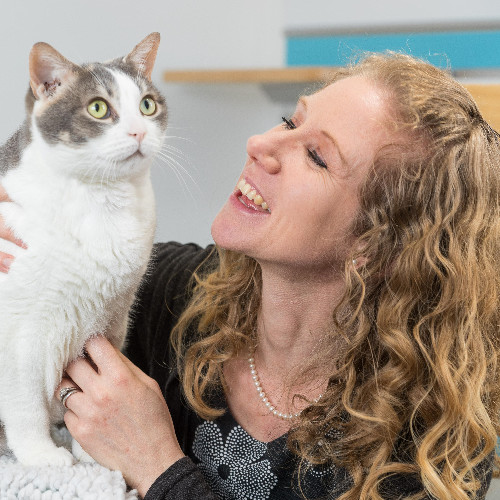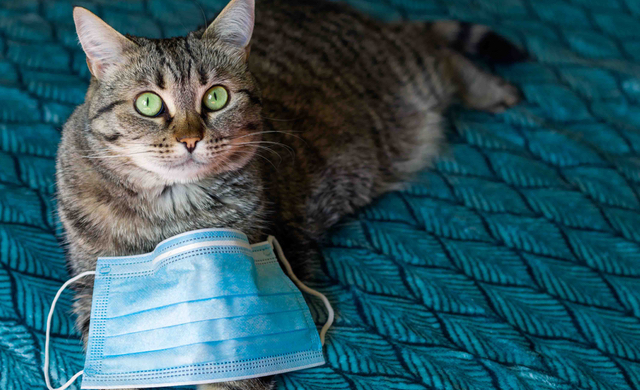
A crash course in virology. What we know so far about COVID-19, pets and people
06/08/2020 06:00AM | 3663 viewsby Joanna Gale
We’ve all had an unexpected crash course in virology over the past few months. The current COVID-19 outbreak is all down to a tiny organism – only visible using a powerful electron microscope – known as SARS-CoV-2. Just like other coronaviruses it resembles a ball covered in spike-like projections known as “coronae”. The word corona means “crown” in Latin, though there is sadly no glittering prize to be won in this battle.
Veterinarians were already familiar with members of the coronavirus family. Varieties of these viruses are well known for causing disease in animals. Many farm animals and pets have their own coronaviruses. Cows, pigs, chickens, cats and dogs all have species-specific versions which can cause diseases of varying severity, affecting different parts of the body. Even turkeys, rabbits, ferrets, rats and mice can catch their very own coronaviruses.
Human coronaviruses and why this pandemic is different
People too, are not unfamiliar with coronaviruses. In humans, they tend to target the respiratory system. When you catch a common cold, part (though not all) of the misery you feel is brought about by one of these spiky, microscopic horrors. There are four human coronaviruses which cause mild illness, but you’ve probably heard of the coronaviruses SARS-CoV and MERS-CoV, both of which caused outbreaks of severe illness in the last 20 years. Though the numbers affected were much smaller than in the current COVID-19 pandemic, the fatality rates were higher (much higher in the case of SARS). Whilst some of these human coronaviruses are highly contagious but not generally lethal, and others are often fatal but not very contagious, the structure of SARS-CoV-2 seems to have given it a horrible combination of being both highly transmissible and lethal too.
Animals and coronaviruses
Whilst governments and the media report daily on the number of people infected and the tragic tallies of those for whom the virus proved fatal, there have been reports of a small number of animals affected with SARS-CoV-2. This is important, and must not be confused with animals being infected by their own species-specific coronaviruses. For example, dogs in many countries are routinely vaccinated against canine coronavirus (CCoV) as it can cause severe, gastrointestinal disease in dogs, and can be particularly nasty in puppies. Though it is part of the same virus family as SARS-CoV-2, it is not the same. It cannot cause COVID-19 and the vaccine offers no protection against the virus responsible for the current pandemic.
Some coronaviruses that infect animals can occasionally be spread to humans and then spread between people, but this is rare. We do know that this is what initially happened with the virus that caused the current outbreak of COVID-19 but it’s not known how, or even which animal species was the source. It’s clear that the virus that causes COVID-19 spreads mainly from person to person. A person doesn’t have to look or feel ill to be infected, and it’s now apparent that these “asymptomatic” sufferers are likely to also play a role in the spread of COVID-19.
Can pets spread COVID-19 to people?
As I write this article, there is no evidence that animals play a significant role in spreading the virus that causes COVID-19 and the data available means the risk of animals spreading COVID-19 to people is considered to be low. In fact, the science so far suggests that it’s more likely to be spread from person to animal than vice versa (caveat: the science is developing every day and this may change).
The first case in the United States of an animal testing positive for SARS-CoV-2 was a tiger with a respiratory illness at a zoo in New York City. In a few different countries, small numbers of pet cats have tested positive for the virus, and a recent experimental study (the cats had the virus put directly up their noses rather than catching it naturally) showed that cats could pass it to one another, even if they didn’t seem ill themselves. Indeed, it seems cats MAY be more susceptible than dogs to this particular virus (previous caveat remains, this may be corroborated or disproven as the science develops). One study looked into how the virus invades host (human) cells to infect them. The scientists involved feel confident that the virus attaches a spike protein to a specific receptor on the host cell (known as angiotensin converting enzyme 2 or ACE2). The researchers also predicted that the COVID-19 virus can bind to the same ACE2 receptor in pigs, ferrets, cats and some non-human primates with similar efficiency as it does in people. Of course, of this animal list, cats are far more likely to be in close contact with humans (who may themselves be infected with COVID-19, with or without symptoms).
There’s a lot of prediction and not much demonstration in this study. This doesn’t mean the researchers aren’t correct in their prediction, but as new science is produced (and it’s coming at a rapid rate right now) this may become more certain, or less certain.
Treat your pets just like you would your own family
For now, the best advice is to continue to care for your pet as normal, but if you or a member of your household have symptoms or a positive test for COVID-19 then treat your pets (of any species) just like other members of the household by keeping them quarantined with you. And anyone taking care of pets, whether healthy or not, should practise excellent hygiene with plenty of handwashing as a routine.
It’s great news that, so far, it seems our pets don’t pose a COVID-19 risk to us. It’s more worrying that we could pose a risk to them (although thankfully the disease seems to only cause a mild illness for them), but it’s better to know that could be the case and put preparations in place for them if your household should have to self-isolate due to the virus.
More tips on keeping pets healthy during these difficult times can be found here. I hope you all stay safe and healthy, and I hope your pets do too.
***
This article was originally published on: https://www.linkedin.com/pulse/crash-course-virology-what-we-know-so-far-covid-19-pets-joanna-gale/?trackingId=hwvh5mvmRFq2pEp7UJUYCg%3D%3D

Joanna Gale is Global Scientific Advocacy and Stakeholder Relations Manager at Mars Petcare
Get connected with Joanna: https://www.linkedin.com/in/joanna-gale-4a45602b/










Post your Comment
Please login or sign up to comment
Comments